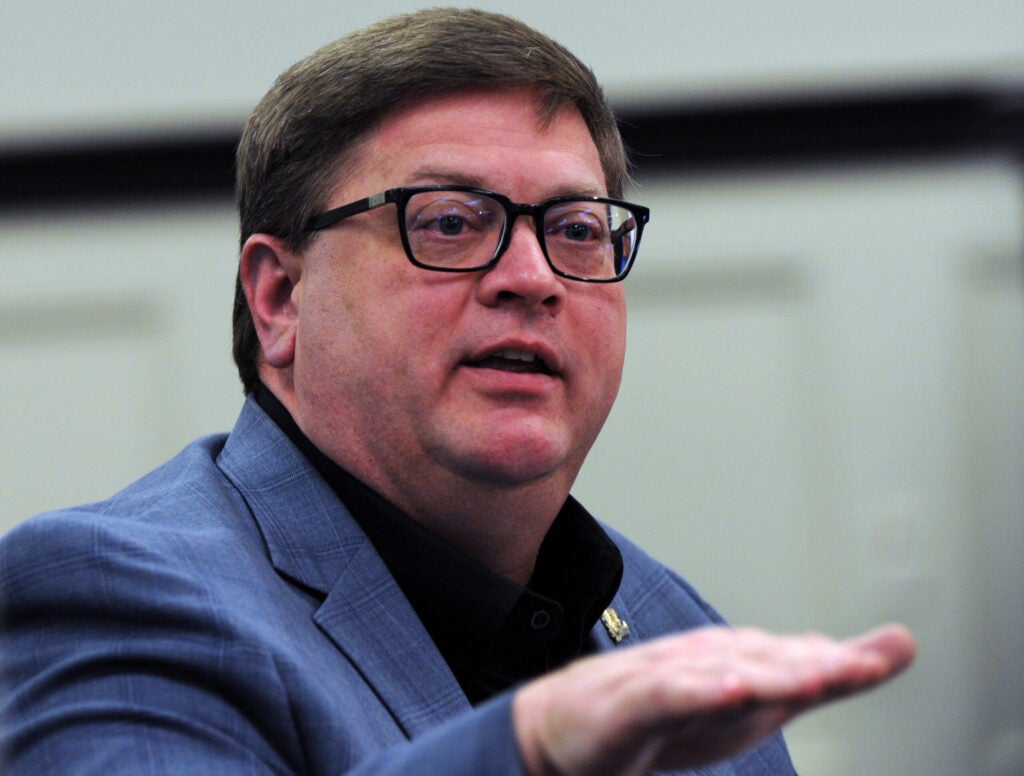House passes tax break for bourbon industry as local governments warn of fiscal ‘devastation’
Published 11:05 am Tuesday, March 14, 2023

- House Appropriations and Revenue chair Rep. Jason Petrie, R-Elkton, sponsored a bill phasing out the barrel tax that distillers pay on aging bourbon. (Photo by LRC Public Information)
|
Getting your Trinity Audio player ready...
|
Kentucky Lantern
The Kentucky House of Representatives approved a move Monday to gradually end a property tax on bourbon barrels — a vote that divided both political parties — the ramifications of which some local governments say will lead their communities to fiscal “devastation.”
House Bill 5, sponsored by Rep. Jason Petrie, R-Elkton, would slowly lift the bourbon barrel tax starting in 2026, increasing the tax cut by a few percent each year and accelerating the cuts through 2039.
There were 11.4 million bourbon barrels in the state as of 2021, and the bourbon industry paid just shy of $40 million in local and state taxes on those barrels in 2022. The breakdown of tax revenue that year in counties where distilleries were located had local schools receiving about $26 million of that, with local and state governments receiving the rest.
Loretto City Commissioner Josh Ballard in a Monday committee meeting said the expansion of the well-known bourbon distillery Maker’s Mark in the Marion County town has led to improvements to local parks, sidewalks and a revitalization of downtown.
But he said the elimination of the bourbon barrel tax would do away with much of that, cutting his city’s budget by more than half.
“The passage of House Bill 5 takes that all away,” Ballard said. “Leaving us with only the fear and concerns the citizens had with Maker’s locating in our city: the blanket of black mold, traffic and wear and tear of their trucks that will continue to use our streets and the memory of past promises made.
Whiskey fungus generated by the alcohol evaporating into the air from bourbon barrels has been a persistent environmental issue in communities that host distilleries.
“I’m here today asking you to honor our handshake with the bourbon industry. Do not devastate my community,” Ballard said.
Pam Thomas, a senior fellow with the progressive research group Kentucky Center for Economic Policy, also testified before the House Appropriations and Revenue Committee. She said the “already lucrative” bourbon industry was receiving plenty of economic incentives and tax breaks.
Thomas said removing the bourbon barrel tax was also considered in the past; a compromise was struck that maintained the bourbon barrel tax while also giving distilleries a tax credit on income taxes based on the bourbon barrel taxes paid.
“They’re back before you now because the income tax liability has been reduced so significantly and the industry has grown so much that they no longer pay enough income taxes to use that credit,” Thomas said.
She added the bourbon barrel tax has provided community services to not only residents but the distilleries themselves.
Because the bill already had two readings when it was heard by the House Appropriations and Revenue, it moved straight to the House floor for a vote. Advocates for the legislation, including House Speaker David Osborne, R-Prospect, said the existing bourbon barrel tax was a hindrance in particular to start-up distilleries.
“I don’t believe that anybody anticipates that the bourbon industry is suddenly going to leave Kentucky,” Osborne said. “I do believe that there is a barrier to entry of new startups.”
Osborne compared the bill’s impact to the state’s horse breeding industry, in which Kentucky had to match economic incentives offered by other nearby states to keep breeders in the state.
“This will help cement ourselves as the bourbon capital of the world,” he said.
Other Republicans and Democrats from distillery communities spoke up against the legislation, echoing the concerns of local government leaders from earlier in the day. Minority Floor Leader Derrick Graham, D-Frankfort, mentioned he’s had three generations of family work at Buffalo Trace Distillery.
“For the very first time in my 21 years here, I will be voting against the distilleries,” Graham said. “Those of us who are here now, may not be here in the next two, four, six, eight years. We don’t know what the economy will be like in the next two, four, six, eight years.”
House Bill 5 was passed on a 58-39 vote, with more than a dozen Republicans voting against the measure.
A complementary bill to House Bill 5 saw near unanimous passage afterwards. House Bill 447 would ensure that school districts that benefited from the bourbon barrel tax receive a minimum “floor guarantee” of state tax dollars for education each year to make up for lost bourbon barrel tax revenue starting in 2025. House Bill 447 does not provide guaranteed future funding to local governments.
Osborne said local governments can still expect to receive the full benefit from the tax revenue for the next few years under the legislation, including tax revenue received as the percentage of the bourbon barrel tax is faded out.
Osborne said local governments “have lots of other revenue options available to them, including taxes that they’re now foregoing in many cases,” Osborne said.
The bill now heads to the Senate.





